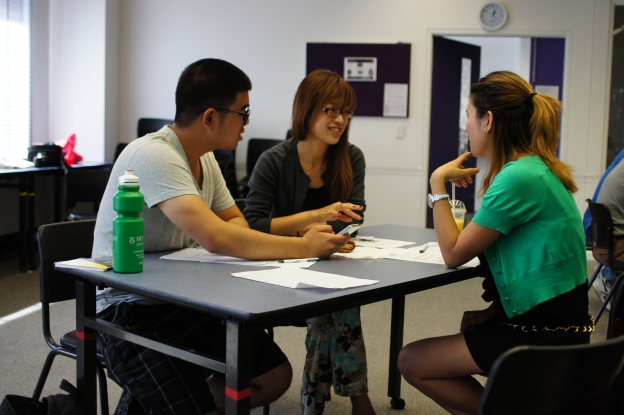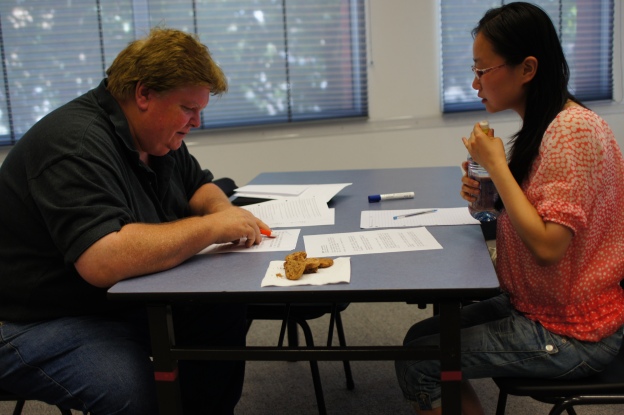Pasted here is the text of an interview that I did with James Friesen, student of translation at Taiwan National University and active translator on Marco Polo Project. James contacted me for an interview to discuss what the work of a translator can be like. This was a great opportunity for me to reflect on the Marco Polo model for collaborative translation, and what might have inspired him – and I had a great time chatting with James!
James Friesen
I read a news article this year on why women in China do not divorce their husbands, even in the face of infidelity and flagrant mistreatment. The piece, actually a vignette of sorts, was aptly written from the perspective of a divorced Chinese woman; the piece was written in translation. She argued that saving face and fear of losing economic status stave off divorce; there was no mention of love. This seemed to me a rare and fascinating insight into the mind of a character that Western readers are not often privy to. The link at the bottom of the page accredited the story to ‘http://marcopoloproject.org’. Following the link lead to the source of the translation and a somewhat unpredictable resource – a vibrant online community of voluntary translators. On the Marco Polo Project one can find many other insightful articles on topics ranging from city life in China, Buddhism and homosexuality in Taiwan, and other short stories. I contacted the founder and CEO of the project, Julien Leyre, as I thought the website was a brilliant idea. I wanted to pick his brain on some issues relating to the project and translation in general. He was kind enough to respond to me, and our exchange eventually culminated in the interview you see below:
JF: For starters, can you briefly share your background, and how you came to the field of translation?
JL: Sure, I would say my background could be separated into two aspects: cultural and intellectual. I am Frenchman who grew up close to the German border; my family is Mediterranean with Italian ancestry. Living in a multicultural environment I developed an interest in language and cultural differences from a very young age and gained an understanding of multiple languages. In university I specialized in languages, majoring in English and Classics at Ecole Normale Superieure, my Masters is in linguistics, and I passed an exam to be a high school and University teacher. I have also been interested in writing from a very young age – things like short stories, poetry, collaborations with filmmakers; I also published a short novel in Paris and have been involved in various writing projects over the last ten years.
JF: Growing up in a linguistically rich environment, was doing translation an intentional decision or something you just fell into?
JL: I guess I fell into it speaking and reading seven languages to various levels; it is common for continental Europeans to speak three or four languages. One of the key things that drew me to translation was my training in classics. One of the things you do when you study classics is translate or re-translate texts from the Greek and Latin. The way I learned how to think in this regard was largely by close reading of Plato and Aristotle while doing a translation. Translation for me is conveying meaning from a certain language to those who cannot access this language. This involves closely reflecting on the way a meaning is constructed in a text – in a word it’s philology. Which is closely reading a text in order to understand what it actually means, and it often involves a process of translation as well.
JF: Can you share a little about the Marco Polo Project?
JL: It’s a website where users can read and translate contemporary writing from China. There are two aspects to it. It’s a collaborative online magazine that proposes Chinese writing in translation by crowd-sourcing the translation, delegating the translation process not through one specific person but to whoever comes and does it. The other way to look at it is a platform that encourages translators and advanced language learners to come and practice translation. It is something that we do anyway as a part of our learning so doing it in collaboration is a good motivation; it is more fun and gives meaning to what we do, essentially the more we do it the more and better we learn.
JF: What does the process of translation look like for you?
JL: It depends on what I translate. On the Marco Polo Project, I translate in layers. I start translating as I go, which is not what I was trained to do – I was told to closely read a text numerous times before starting. I start with a quick translation as I go, using google translate on the side, anything that is simple, to get an overall idea of what I’m translating. A rough patchy draft, let it rest, and come back to it to fill in the blanks, and improve what I had translated the first time, and finalize it, looking for consistency – also sometimes, consulting a native speaker to confirm doubtful passages of the meaning of idiomatic expressions.
JF: Does translation theory enter into the picture? For example, do you apply what you learned in your classics training?
JL: I would say it is in the background. What I mean is, because I spent time lecturing and doing research in linguistics in semantics, of which translation theory was a part, I completely absorbed it. It has become a part of the way that I think and not a conscious process anymore, almost like breathing. Secondly, it’s about how you relate as a mediator between the original text and the audience, which are two different worlds. You will position your translation in between these two worlds. The type of text determines the type of audience and how they relate to the text. In translating a vacuum cleaner manual you will not care so much about the way the original text is structured, rather you will care more about the meaning. Translating poetry however, you will stay much closer to the structure of the original. Texts on the Marco Polo Project are creative non-fiction, essays, blog posts, and so they sit somewhere in between.
JF: What draws you to a given piece? What makes you say, “I want to translate that”?
JL: The simple answer is gut feeling, but the gut feeling has something behind it. I look for a piece that is original and well structured. By originality I mean the content of the piece is something I have never read about before. Generally the more specific a piece is, the more likely I am to translate it. For example there is a piece called ‘The Tears of Animals’. I thought, wow, a Chinese person is speaking about how they relate to animals crying, I had never heard about that before, I want to translate that. I also choose pieces that are clearly articulated, ones that you can follow the construction. If you choose a piece based only on style, there is often a big distance between Chinese and English which makes translation very difficult, but a structured piece translates relatively well.
*Link to ‘The Tears of Animals’ (http://marcopoloproject.org/online/the-tears-of-animals/)
JF: What are some advantages/challenges of having a ‘living online community’ collectively translate something?
JL: There are two main advantages to this type of platform, and I will start with the more cynical one. It makes translation cheap. The problem that we have is that there is a growing to demand to understand China; content written in Chinese is a good way to address this demand. But if you use the old model of sending a work to a professional translator with a high level of quality control etc. it’s really slow and there are not enough translators to meet the need. By crowd sourcing you can reduce cost. Translating collectively can help people to do better work and give them a sense of accomplishment through collaboration, for example if you translate a small part of a large piece. Translators can help other translators, it gives a sense of meaning and community. Are they actually good and accurate? To an extent I think people undervalue the quality of translations by people who are not professionals. As a language teacher, I thought the translation of my students were not too bad, however you do need to monitor that a little bit. The other challenge is keeping the good translators interested because a native English speaker who is also fluent in Chinese is hard to keep, there is lots of demand on their time, so it’s about finding ways to encourage people and keeping them engaged. A living online community requires moderation, giving feedback to people, providing new content, etc. so it takes a lot of work, it doesn’t do itself.
JF: Blog translation seems like it is becoming an independent genre, and beyond that, a mouthpiece for censor-dodging Chinese users. What implications does this have?
JL: The question of censorship is something we’ve thought about from the start of the project. We want to bring across a diversity of voices from China, which may include some sensitive material, but we do not want to be blocked from China as that would defeat the purpose. We want the material to be available for Mainland Chinese; we want to stay out of trouble but at the same time avoid just replicating government speech, there’s no point in that. So we have to play it by ear, but we basically try to focus on some good non-sensitive material. Sensitive areas include Taiwan, Tibet, Xinjiang, demonstrations against the government, some comparatively non-sensitive areas for example are gay rights, feminism, love relationships, and the way technology is affecting the life in big Chinese cities. Western media happens to be, in my perspective, obsessed with sensitive topics, Ai Weiwei and Chen Guangcheng are all over the news. But there are other intellectuals who do an insiders view on China, for instance Li Yinhe, who studies gender issues, is not popular in Western media but also not censored in China. Topics like these are less covered and, quite possibly, more original and more interesting because of it.
JF: What are your goals for the future of Marco Polo Project?
JL: I would like the project to show up on the list of the top 20-25 major reference websites on China. I would like it to be on the radar of translation students and people doing research and analysis on China, in terms of language learning and practice, as well as reporting, media, etc. I would like to build a bigger and more active community than we have at the moment, and there are a couple ways of doing that. We are doing a campaign right now to pay for a few improvements on the interface, to make it more user-friendly. The other way is to build partnerships with institutions, especially language learning institutions, translation centers etc. We believe that if teachers recommend the platform to their students and possibly even integrate it into their curriculum, We will be trialing that at La Trobe University in Australia, so we can refine the idea of how to put it in a workshop etc. and hopefully in the future we can take that model elsewhere.







